In Focus: As Connections for the Homeless looks to purchase the Margarita Inn, residents remain divided on the building’s future
May 23, 2022
More than 200 people packed St. Mark’s Episcopal Church on March 13 for a special 4th Ward meeting. They were all prepared to discuss the same topic: the future of the Margarita Inn.
The building, located in the northern part of the 4th Ward, opened in 1927 as the Margarita Club for Working Women. Converted into the Margarita Inn in 1989, the space then adopted a European motif with antique furniture, a fully furnished library and an Italian restaurant.
In May 2019, Evanston found the Margarita Inn owed $477,972 in unpaid hotel and parking taxes. After the COVID-19 pandemic caused an industrywide recession in March 2020, the city provided the hotel a chance to pay off its debt in exchange for sheltering houseless individuals through a partnership with local nonprofit Connections for the Homeless.
[Read more about the effect of the pandemic on hotels in Evanston here.]
Nia Tavoularis, director of development and communications at Connections for the Homeless, said the Margarita Inn currently houses about 60 people. She said the inn offers community spaces, close proximity to public transit and a central location for participants and nearby houseless people.
After more than two years of partnership, Connections is now looking to purchase the Margarita Inn. Tavoularis said the organization’s two years of experience running the inn and longstanding presence in Evanston prepare it to continue operating in the space.
But some residents aren’t sure. At the March meeting, opposing voices took a stand.
Resident Chris Dillow, who has lived in the 4th Ward for 15 years, said he feels Connections’ operations are “un-thought out.” He said repurposing the inn isn’t in the ward’s best interest.
Dillow said residents showed up to the March meeting because they felt they had not been consulted. But instead of seeking community input, the meeting felt like an opportunity for Connections to present its work, Dillow said.
“(The meeting) didn’t come from like, ‘Hey, 4th Ward. Is this something that we want? Is Connections a good neighbor?’” Dillow said. “It was like ‘Here, I’m going to sell Connections to the community.’”
However, other community members, like Dan Cox, a 4th Ward resident for about three years and a Connections board member, say the Margarita Inn is providing the community with needed services.
Cox said the Margarita Inn provides houseless people with an address and safe place to keep their belongings, alleviating some of the obstacles they face when seeking employment.
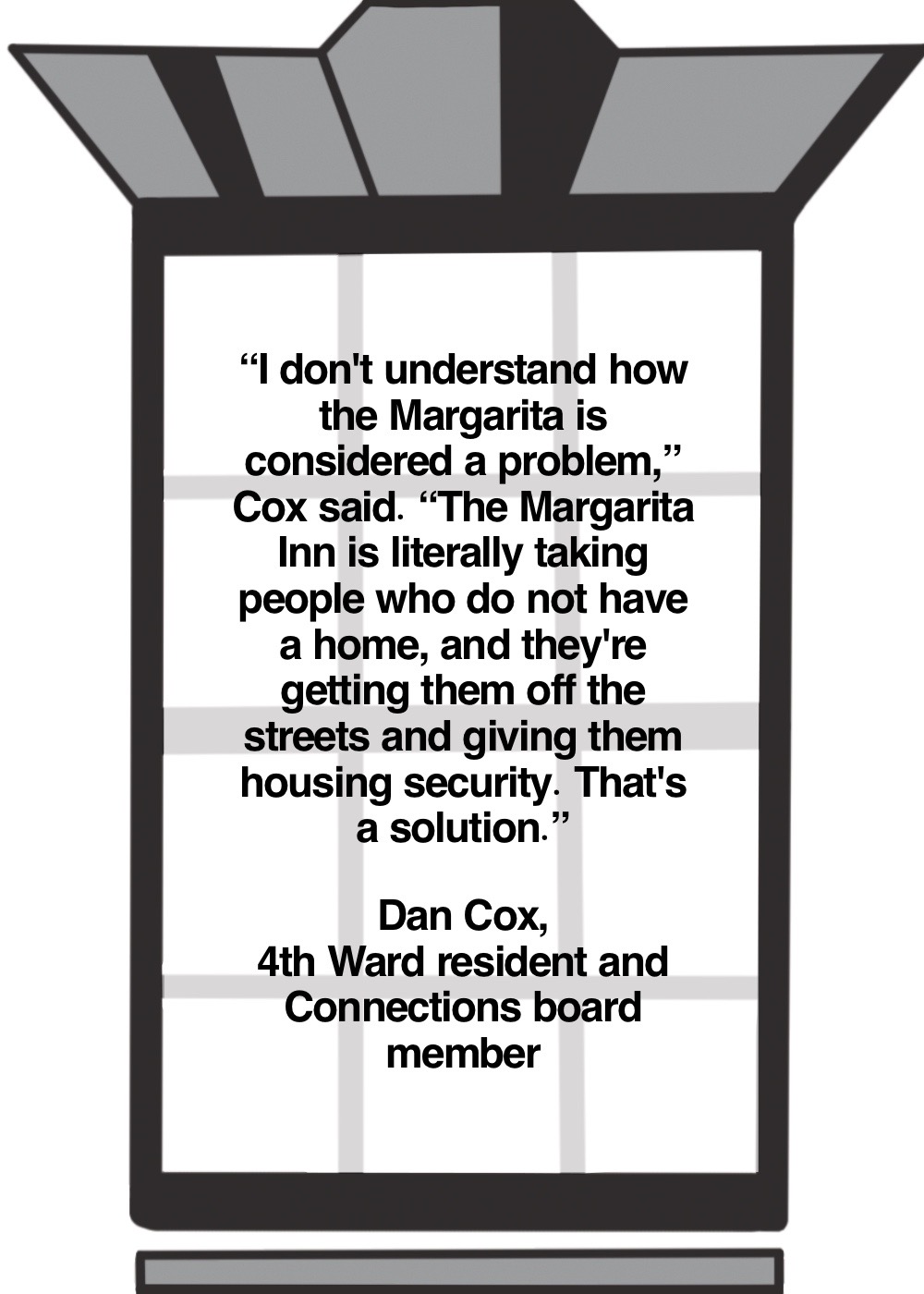
“I don’t understand how the Margarita is considered a problem,” Cox said. “The Margarita Inn is literally taking people who do not have a home, and they’re getting them off the streets and giving them housing security. That’s a solution.”
Defining a designation
At the end of February, Connections applied for zoning approval and categorization for the inn as part of its acquisition process. In March, Evanston Zoning Administrator Melissa Klotz ruled the facility would be zoned under the broadly used rooming house designation — but the building’s previous special use permit had expired, shifting Connections’ next steps.
Without the special use permit in place, Connections is required to undergo the special use process, which involves public testimony.
Zoning applications are “merely an administrative process,” according to Ald. Jonathan Nieuwsma (4th). But some residents said they became concerned about a potential lack of transparency from Connections after the application was filed.
Dillow and another 4th Ward resident, John Cleave, filed an appeal against the rooming house designation. Dillow believes the facility should be zoned as a homeless shelter due to the “population that it serves.” By zoning the building as a rooming house, Connections will not be sufficiently regulated, he said.
But Nieuwsma said the rooming house definition is “one size fits all.” The McGaw YMCA, which serves hundreds of houseless men each year, also has a rooming house zoning designation.
Tavoularis said the rooming house definition is also more accurate to Connections’ work as an organization. The rooming house definition encompasses the temporary housing Connections provides, she said, while a transitional housing zoning code would limit operational hours.
“The ability to provide 24-hour care, 24-hour support, services and programming in the daytime, a private bedroom, a private bathroom, the ability to lock a door, shut your door — it is really transformational for the people who are staying there,” Tavoularis said.
Fallout in the 4th Ward
Since Connections took over, Don Durkes, an Evanston resident who has lived near the Margarita Inn for 16 years, said he’s noticed “significant change in the neighborhood.”
Though he is unsure whether the individuals he’s seen are Margarita Inn participants, Durkes said he’s witnessed people damaging property, interrupting traffic and yelling over the last two years.
Prior to the start of the pandemic, he said he saw panhandlers on major streets, but he didn’t see them in his neighborhood or other nearby residential areas. Now, he said he’s noticed more people with “rather incompatible characteristics to a social environment” closer to his residence.
“(The Margarita Inn will) bring in other folks from other areas, say north Rogers Park, or anyplace else that may have a homeless population, and they’ll come to Evanston (and) hang out here,” Durkes said.
Susan Barrett-Kelly, a 4th Ward resident of 27 years who lives blocks away from the inn, said she hasn’t noticed anything abnormal happening around her home in the last two years.
Barrett-Kelly hasn’t noticed increased noise or litter, and she said she has not seen any data proving the Margarita has attracted more unhoused people to the area.
“It’s hard to average, but I’m a frequent person who walks around the neighborhood,” Barrett-Kelly said. “Neighbors had said there was a significant increase in panhandlers. My experience was there was not a significant increase in panhandling.”
Paul, a former participant in the Margarita Inn program whose last name was omitted for privacy reasons, said he doesn’t see the inn “hurting anybody.”
“It’s important for (participants) to see life,” Paul said. “There was times when I was sitting in a window and I was seeing people getting up, and I knew they were getting up and going to work, and my thoughts were, ‘That should be me.’”
While Nieuwsma said Connections’ presence in the inn may draw unhoused people to the ward, he believes its services are a net positive for the community.
He said Connections is not responsible for everything that happens on the street, but it might be blamed for all issues. 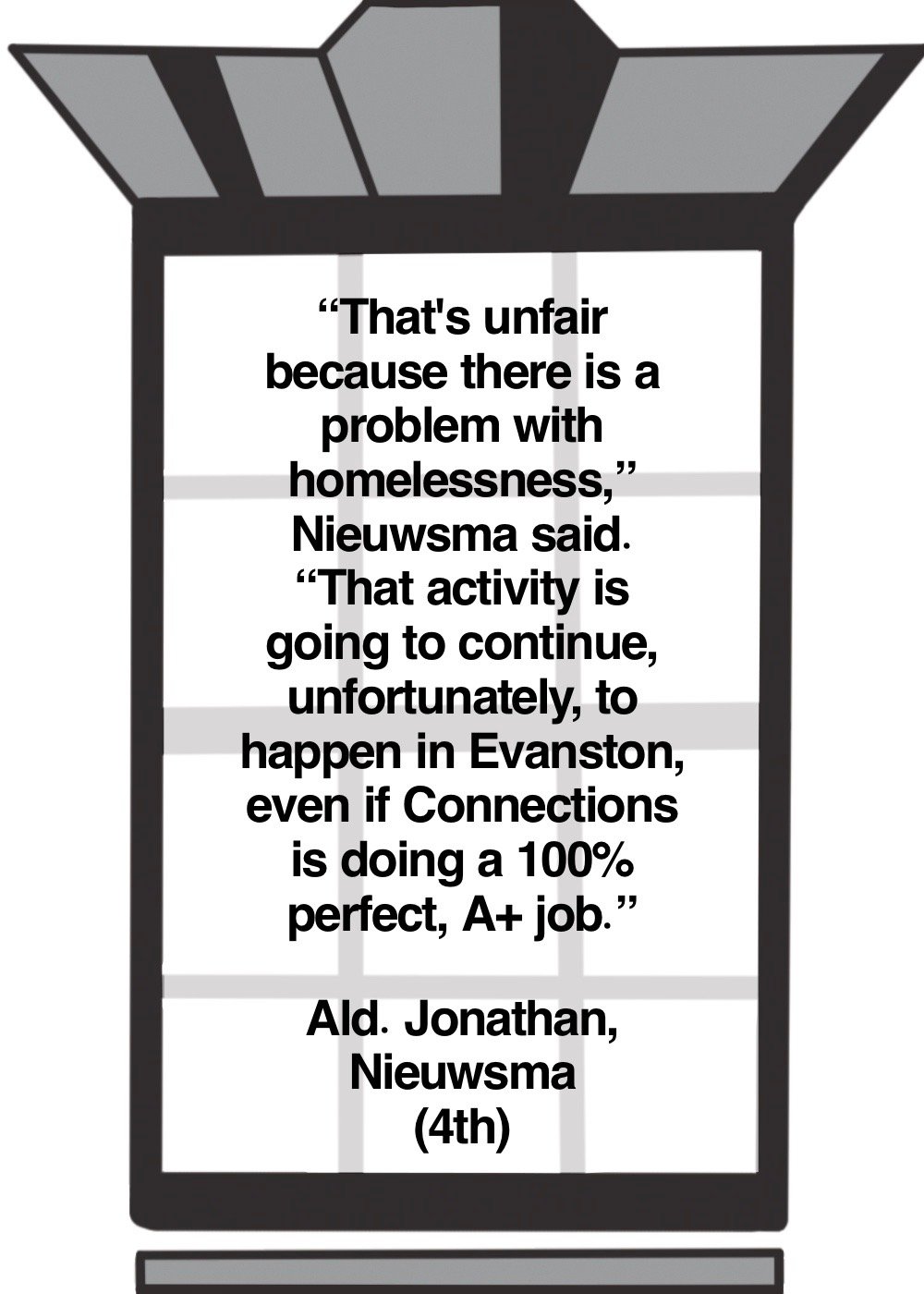
“That’s unfair because there is a problem with homelessness,” Nieuwsma said. “That activity is going to continue, unfortunately, to happen in Evanston, even if Connections is doing a 100% perfect, A+ job.”
Fostering emergency and police relations
Connections has a staff-run internal report system at the inn, which Tavoularis said logged about 700 incidents in 2021. Many are minor disagreements between participants, but she said the logs also include emergency calls.
However, Tavoularis said this internal incident report data does not match data the organization received from Evanston Police Department for the inn’s address.
Betty Bogg, the executive director of Connections for the Homeless, said the organization cannot locate about 60% of EPD data in its own internal reports, though this figure has decreased since the two first started communicating data.
There is not a clear pattern behind why the two reports are not matching, Bogg said.
“If it’s on our end … and our staff isn’t writing it down, that is clearly a problem that we will address,” Tavoularis said. “Our anecdotal experience is not that that is what is happening.”
Tavoularis said Connections and the city’s police and fire departments keep in contact through a bimonthly meeting.
In a statement to The Daily, EPD Sgt. Chelsea Brown said the groups are collaborating to “maintain quality of life” for neighbors.
Tavoularis said she sympathizes with police officers because they don’t have the adequate tools to address homelessness around the city. She said police often face the reality that there are few places where houseless people can turn in Evanston.
In most cases, unhoused people in Evanston are aware of Connections and its services, but there aren’t enough resources to go around, she said.
“I’m really empathetic to the fact that people look at (the police), and they’re like, ‘But you’re supposed to be able to solve this problem.’ And they’re like, ‘We don’t have any resources to solve the problem,’” Tavoularis said.
Broader structural issues
Connections’ goal is to place Margarita Inn participants into stable housing, Tavoularis said. This can include nursing homes, moving back in with family and Section 8 housing vouchers, which help low-income people to afford safe housing through federal funds.
Tavoularis said many of these options are backed up. In the last two years, she said the permanent housing program run by Connections had about three open units. The Section 8 waitlist is not always open, and Tavoularis said finding affordable housing can take a long time.
“Even if you’re the perfect candidate and you perfectly qualify for something like permanent supportive housing, there aren’t more units,” Tavoularis said.
Northwestern sociology Prof. Mary Pattillo, the chair of the African American Studies department, said the government does not create enough affordable housing for those in need, and it also does not create enough jobs for people to afford existing housing. She said this furthers housing instability, as people end up living in unstable conditions or homes out of their price range.
Dino Robinson, a local Black historian and the founder and director of Shorefront Legacy Center, said Evanston’s high property costs and taxes make it difficult for the city to “even visualize what affordable housing looks like.”
Evanston has the capability to create solutions, he added.
“If (Evanston) is really serious about (creating affordable housing), they’re in a position to create land trust to make affordable housing in land that they own and keep the price stable,” Robinson said.
A lasting history of housing discrimination
Housing struggles for marginalized communities are not a new issue, said Pastor Monté Dillard, vice president of Connections’ Board of Directors.
“There was a system that ensured certain people didn’t live in certain parts of the city, so to see it now being an issue towards the homeless population is certainly gut-wrenching,” Dillard said.
Robinson said discriminatory housing and property practices have existed throughout Evanston’s history. He said these practices have especially harmed the city’s Black community, and their effects can still be seen today.
Though Robinson said Evanston may appear diverse on paper, the city historically dictated where certain people can live through redlining. The practice has led to lasting stereotypes about predominantly Black communities.
Redlining began in the 1930s after the federal government incentivized mortgage lenders to lend money to homeowners, according to Pattillo.
The Home Owners’ Loan Corporation graded neighborhoods nationwide based on criteria including the presence of immigrant groups and Black residents, often rating them poorly. As a result, Pattillo said these neighborhoods experienced both physical deterioration and economic devaluation.
“(The criteria for redlining) matters because whiteness has a value,” Pattillo said. “(There) is white supremacy, (there) is racism that is deeply intertwined with the founding formation and contemporary reality of our country.”
Pattillo said home values still increase when a Black family is not visibly residing in a property.
The resistance to the houseless population entering the 4th Ward may come because of these patterns, Dillard said, and some residents’ perception of the city and its privilege influence that opposition.
Robinson said many assumptions about homeless people are based in fear. He said the mindset that certain developments are “inappropriate” for predominantly white communities seems to be a driving force for most opposition in Evanston.
The city’s history of exclusion has also led to a predominantly white city government and administration. The 4th Ward is 64.1% white according to 2020 Census data, but Dillard said the Margarita Inn primarily serves people of color. Without a diverse body in governance, Robinson said bias will ultimately end up influencing city decisions.
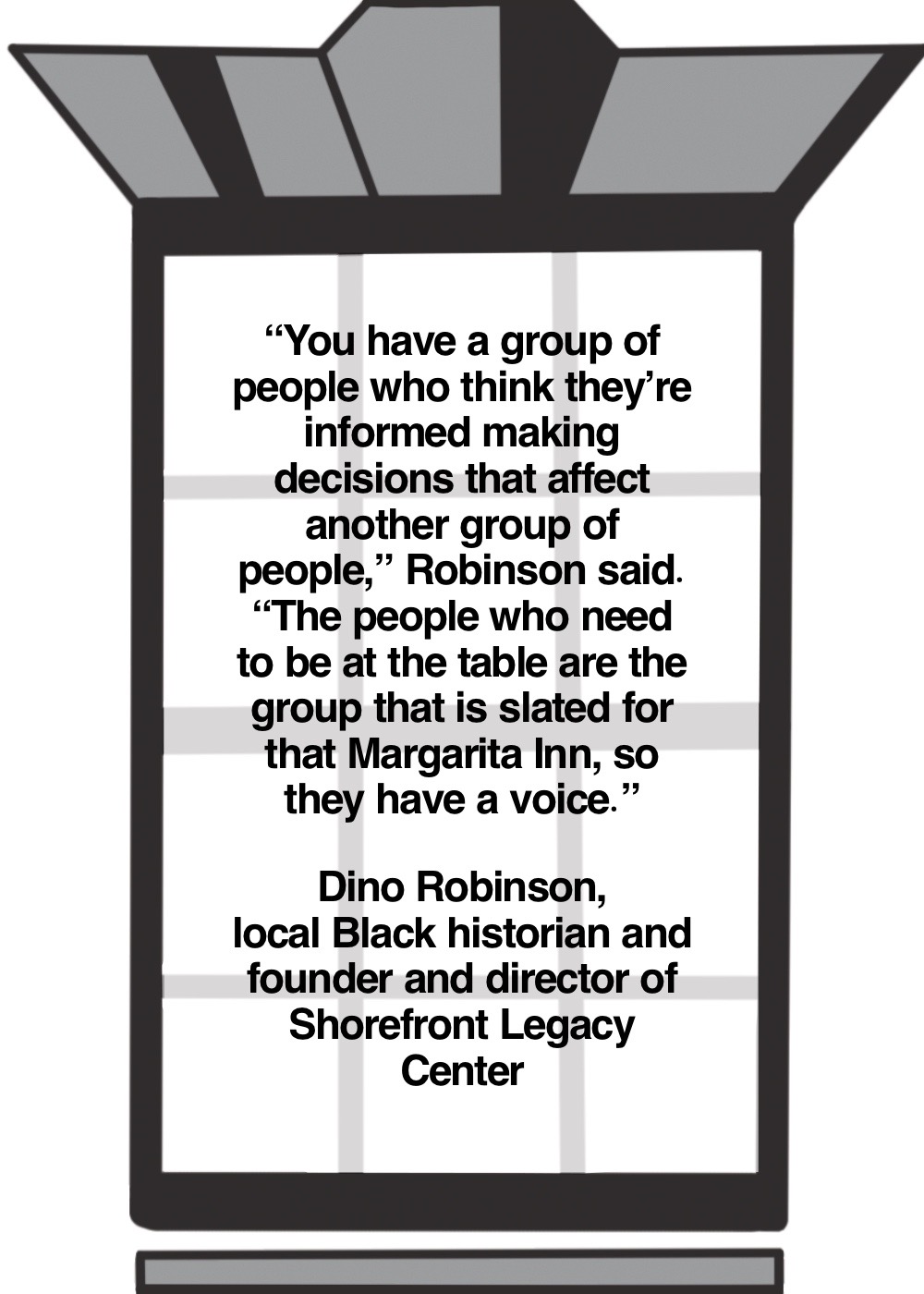
“You have a group of people who think they’re informed making decisions that affect another group of people,” Robinson said. “The people who need to be at the table are the group that is slated for that Margarita Inn, so they have a voice.”
Pattillo said elected officials are more willing to listen to middle-class home-owning communities than other groups. Whiteness often increases the success of “not in my backyard” efforts, she said, and American values of hard work and self-restraint contribute to the stigmatization of poor people.
Dillard said many Evanston residents verbalize a desire for inclusion within their community — but they don’t always follow through with their actions.
“The most disheartening component is that we live in a community that screams, ‘We want equity,’” Dillard said. “But when it’s time to put it into practice, we get what we’ve seen recently.”
Within the walls
Some community members, like Durkes, have opposed Connections’ takeover of the inn because they question whether the organization provides adequate social and mental health services at the facility.
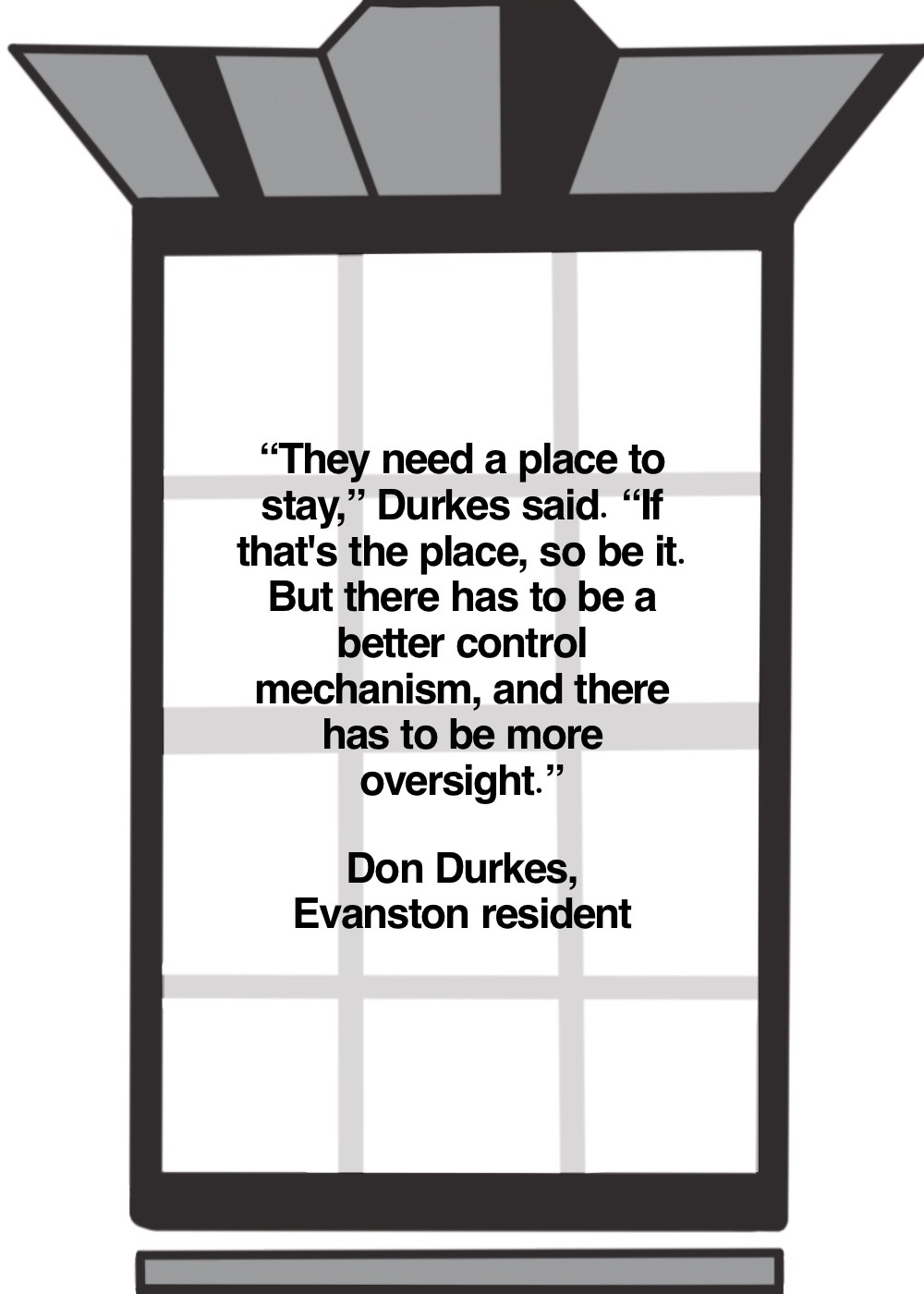
“They need a place to stay,” Durkes said. “If that’s the place, so be it. But there has to be a better control mechanism, and there has to be more oversight.”
Durkes said there are model houseless shelters that provide more formal support, like the Write Inn in Oak Park, Illinois, run by Housing Forward.
In an email to Nieuwsma, Cleave compared the two programs’ turnaround rates, saying the Write Inn aims to get people in and out within 90 days, while the Margarita Inn averages a 10-month period of stay.
Though 90 days is the ideal time frame, Tavoularis said it is “nearly impossible” to consistently meet that mark.
Tavoularis said Connections and Housing Forward worked together to develop their operating systems and communicate regularly.
Both organizations are part of the Alliance to End Homelessness in Suburban Cook County. She said the federal government evaluates the alliance’s programs for funding based on how quickly its members transition people from shelter into housing. Ten months is a relatively short amount of time, she added.
Like Housing Forward, Tavoularis said Connections screens potential applicants and engages in diversion, a process that helps the organization assess an individual’s vulnerability and determine the next steps for those in crisis.
Connections provides a weekly programming schedule to its participants, Tavoularis said. The events range from social activities to workshops on financial literacy and employment.
The Margarita also offers 24-hour medical and behavioral health support. Medical staff provide over-the-counter medication, transportation to healthcare appointments and emergency services. Two caseworkers also help oversee the inn’s participants and take care of mental health needs, including referrals to addiction support.
Paul, the former Margarita Inn participant, said when he first entered the program, he didn’t care about anything and had lost everything. While at the inn, Connections helped him with legal obligations and finance organization, he said.
“I just didn’t know which way to turn,” Paul said. “I didn’t know where to go. (God) put me in a place where my soul could restore. I could get my mind right. I could get my heart back.”
To be a good neighbor
In order to address resident concerns, Nieuwsma said he is working with Connections to develop a legally binding Good Neighbor Agreement, which will involve ongoing relationship-building through community meetings.
Tavoularis said Connections proposed the agreement to build better relationships with the community. She said the organization approached Nieuwsma last year to lay out plans and is committed to providing transparency.
Though good neighbor meetings were originally scheduled to begin in mid-March, Tavoularis said Connections postponed them to allow leaders like Mayor Daniel Biss to get involved. She said Connections is waiting to follow Biss and Nieuwsma’s lead to resume the meeting plans.
Cox, the 4th Ward resident and Connections board member, said he thinks Connections is ready to host discussions and figure out appropriate agreements. He’s less sure that some opponents will warm up to the inn. A Good Neighbor Agreement with the city could help reconcile the differences in opinion, he said.
Nieuwsma said communication and understanding have to go both ways.
“We as a community need to understand the concerns of the neighbors that live next door to the Margarita Inn,” Nieuwsma said. “But we as a community also need to understand that Connections has professional expertise in homeless shelter management and give them the benefit of the doubt.”
A shared story
Ahead of the Land Use Commission’s ruling on Dillow and Cleaves’ appeal, which is scheduled for Wednesday, Dillow said he doesn’t think Connections is the right organization to execute a good shelter model.
“I don’t know that they’ll fail, but I cannot find a path that says ‘Oh, this could work out,’” Dillow said.
Others are more optimistic. As Connections moves forward in the purchasing process, Dillard said he hopes people in the surrounding community are willing to challenge their preconceived notions of homelessness. He said people’s perception of their risk to personal safety based on their proximity to people experiencing houselessness is exaggerated.
Dillard said he thinks the Margarita Inn could serve as a model for future communities.
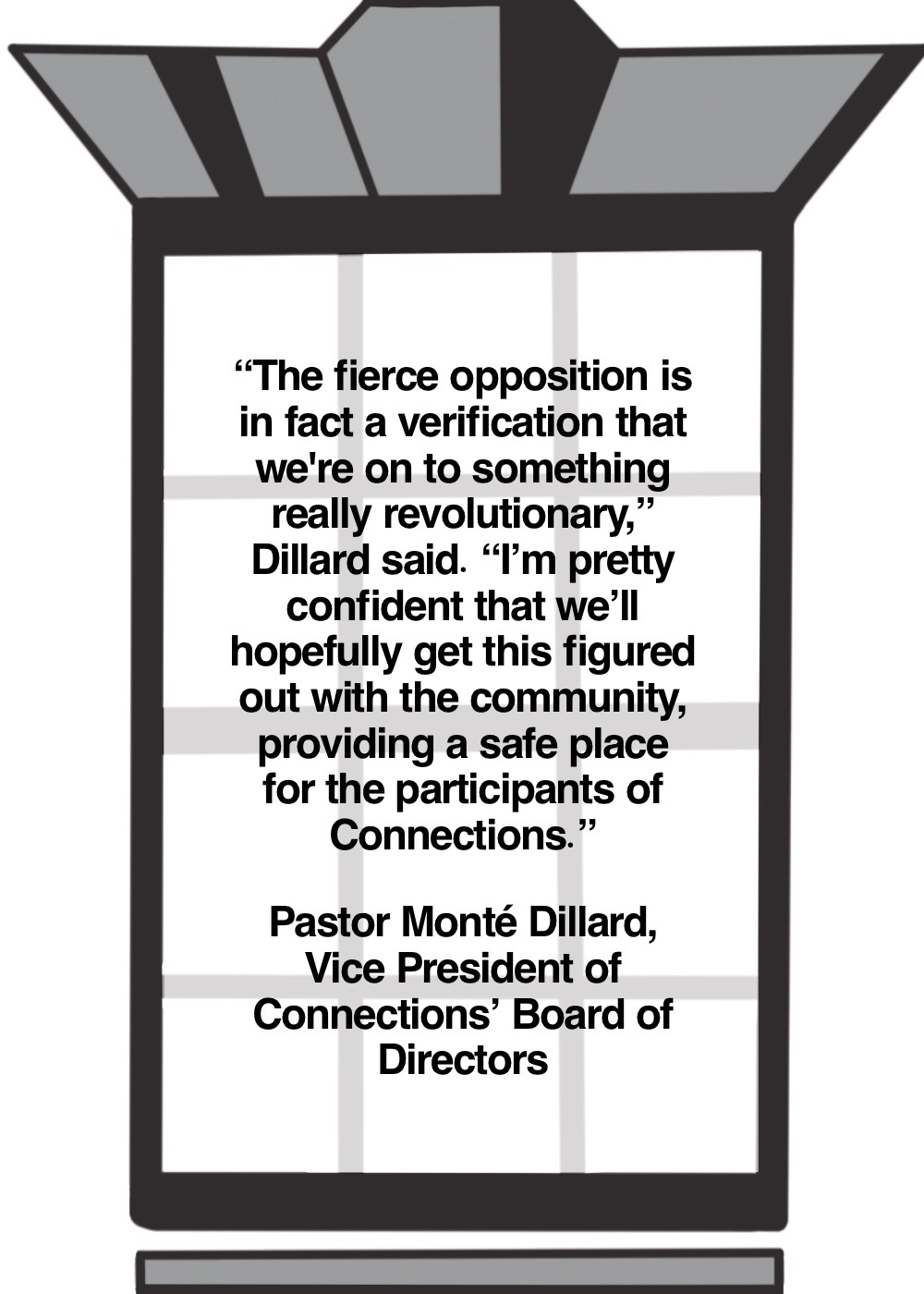
“The fierce opposition is in fact a verification that we’re on to something really revolutionary,” Dillard said. “I’m pretty confident that we’ll hopefully get this figured out with the community, providing a safe place for the participants of Connections.”
Barrett-Kelly, the longtime 4th Ward resident, said she would like to see the Margarita Inn system work.
She said more open communication and care for residents in the community could help the inn’s opponents get on board.
“We all own this story. We all own this problem. Whether we asked for it or not, we all have a part in solving it,” Barrett-Kelly said. “So let’s try to solve it.”
Email: [email protected]
Twitter: @joannah_11
Related Stories:
— As Evanston looks to post signs discouraging panhandling, some residents question
— The lasting impacts of Evanston redlining
— In Focus: In an industry ravaged by COVID-19, Evanston hotels struggle to make ends meet

